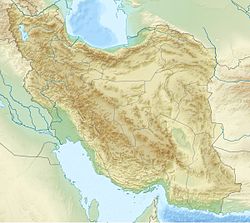Bastam (Persian: بسطام)[a] is a city in, and the capital of, Bastam District of Shahrud County, Semnan province, Iran.[4]
Bastam
Persian: بسطام | |
|---|---|
City | |
 Bayazid Shrine Complex | |
| Coordinates: 36°29′05″N 55°00′00″E / 36.48472°N 55.00000°E[1] | |
| Country | Iran |
| Province | Semnan |
| County | Shahrud |
| District | Bastam District |
| Elevation | 1,450 m (4,760 ft) |
| Population (2016)[2] | |
• Total | 8,609 |
| Time zone | UTC+3:30 (IRST) |
| Area code | 0233252 |
| Website | www |
History
editBastam was founded in the 6th century in the Greater Khorasan. It is 6 kilometres (3.7 mi) north of Shahrud. The town is known for its Islamic monuments from the Ilkhanid period and its association with the mystic Bayazid Bastami.[5] The Alborz are to the north of the town.
The 19th-century poet, Abbas Foroughi Bastami, lived in Bastam for a time and thence acquired its name as his own. The early Bábí leader and martyr Mullá ʻAlíy-i-Bastámí was also raised in Bastam, and was a significant figure in the Shaykhi movement and later became the first person known to have died for their allegiance to Bábism.[6]
A tradition says that the town was founded by Vistahm, uncle of the Sasanian king Khosrau II.[7]
The historical town of Bastam embraces the holy shrine of Mohammad Ibn Jafar Sadegh (AS), Bayazid Bastami tomb, Bayazid Monastery, Bayazid Mosque, Eljaito Iwan, Ghazan Dome, Jame Mosque, Kashaneh Tower, and Shahrokhieh School, which were built in different eras from Seljuk era (1037–1194) to Qajar period (1789–1925).[8]
Demographics
editPopulation
editAt the time of the 2006 National Census, the city's population was 7,382 in 1,997 households.[9] The following census in 2011 counted 8,609 people in 2,713 households.[10] The 2016 census measured the population of the city as 8,609 people in 2,713 households.[2]
See also
editNotes
editReferences
edit- ^ OpenStreetMap contributors (7 January 2025). "Bastam, Shahrud County" (Map). OpenStreetMap (in Persian). Retrieved 7 January 2025.
- ^ a b Census of the Islamic Republic of Iran, 1395 (2016): Semnan Province. amar.org.ir (Report) (in Persian). The Statistical Center of Iran. Archived from the original (Excel) on 17 November 2020. Retrieved 19 December 2022.
- ^ Bastam can be found at GEOnet Names Server, at this link, by opening the Advanced Search box, entering "-3055749" in the "Unique Feature Id" form, and clicking on "Search Database".
- ^ Habibi, Hassan (c. 2024) [Approved 21 June 1369]. Approval of the organization and chain of citizenship of the elements and units of the national divisions of Semnan province, centered in Semnan city. lamtakam.com (Report) (in Persian). Ministry of the Interior, Defense Political Commission of the Government Council. Proposal 3233.1.5.53; Letter 93808-907; Notification 82836/T140K. Archived from the original on 2 January 2024. Retrieved 2 January 2024 – via Lam ta Kam.
- ^ Bloom, Jonathan M.; Blair, Sheila S., eds. (2009). "Bistam". The Grove Encyclopedia of Islamic Art & Architecture. Vol. 1. Oxford, England: Oxford University Press. p. 291.
- ^ Amanat, Abbas (1989). Resurrection and Renewal. Cornell University Press, New York, USA. pp. 212, 235. ISBN 0-8014-2098-9.
- ^ R. N. Frye, “Bisṭām” Encyclopaedia of Islam, ed. by P. Bearman, et al. (Brill 2008).
- ^ "German archaeologist Wolfram Kleiss, famed for intensive Iranian studies, dies at 90". www.tehrantimes.com. 22 December 2020. Archived from the original on 23 December 2020. Retrieved 22 March 2021.
- ^ Census of the Islamic Republic of Iran, 1385 (2006): Semnan Province. amar.org.ir (Report) (in Persian). The Statistical Center of Iran. Archived from the original (Excel) on 20 September 2011. Retrieved 25 September 2022.
- ^ Census of the Islamic Republic of Iran, 1390 (2011): Semnan Province. irandataportal.syr.edu (Report) (in Persian). The Statistical Center of Iran. Archived from the original (Excel) on 20 January 2023. Retrieved 19 December 2022 – via Iran Data Portal, Syracuse University.
External links
edit
